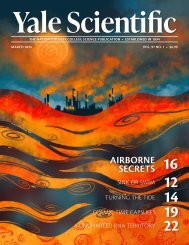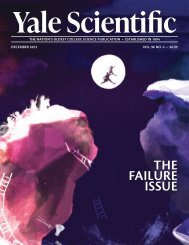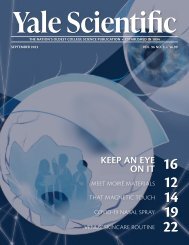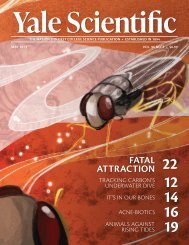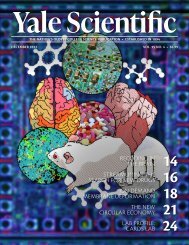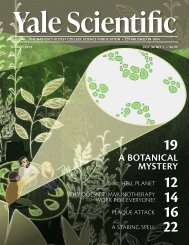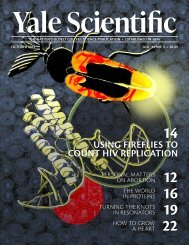YSM Issue 90.1
Create successful ePaper yourself
Turn your PDF publications into a flip-book with our unique Google optimized e-Paper software.
medicine<br />
NEWS<br />
THE FLU SEASON CRAVINGS PARADOX<br />
The connection between metabolism and disease outcome<br />
►BY MARY CHUKWU<br />
www.yalescientific.org<br />
PHOTOGRAPHY BY CHUNYANG DING<br />
►Yale researchers in Professor Ruslan Medzhitov’s lab found<br />
connections between metabolism and infection that may lead to<br />
new approaches to nutrition for the critically ill.<br />
As winter settles in, perhaps the only seasonal “foods” more iconic<br />
than hot chocolate and s’mores are cough drops and tea. Why do<br />
some people want to weather colds holding steaming bowls of comforting<br />
soup, while others suffer queasy stomachs and leave dinner<br />
plates untouched? The seemingly paradoxical appetite changes associated<br />
with sickness are a well-recognized and evolutionarily ancient<br />
trait, but up until now scientists could only speculate about<br />
their cause and purpose.<br />
Yale researchers led by Ruslan Medzhitov, professor of immunobiology<br />
at the Yale School of Medicine, have found that the answer<br />
to this puzzle lies with the causes of infection. The key insight of<br />
their research is that not all sicknesses are created the same. Fighting<br />
viral versus bacterial infections requires completely opposite<br />
nutritional needs. The findings of their research hold the potential<br />
to transform how healthcare approaches nutrition in illness.<br />
The researchers began by tracing out how anorexia, or loss of appetite,<br />
affects disease outcome in bacterial infections. Researchers<br />
infected mice with Listeria monocytogenes, a common cause of<br />
food poisoning. Mice that were fed during infection died; those<br />
who did not eat lived.<br />
Similarly, the researchers infected mice with influenza virus, the<br />
cause of the flu, and again varied caloric intake. Now the fortunes<br />
were reversed: fed mice survived viral infection while those that did<br />
not eat mostly died. These trends held true not only for infection<br />
but also when the experiments were repeated for bacterial and viral<br />
inflammation—whole body immune activation.<br />
The real story linking nutrition and disease, however, emerged in<br />
the search for the nutrient causing the outcomes. Between protein,<br />
fat, and glucose, only glucose was required to induce the complete<br />
effects of caloric intake. Moreover, blocking glucose utilization rescued<br />
bacteria-infected mice while killing virus-infected mice.<br />
Interestingly, glucose does not change the number of pathogens<br />
or the strength of the immune response. Instead, glucose<br />
shapes the role of metabolism in the body’s tolerance of the immune<br />
response. Metabolism refers to all the chemical reactions<br />
needed to sustain life; use of the immune system comes at a price.<br />
“Depending on the type of inflammation or infection, there<br />
are different metabolic processes that are necessary to survive the<br />
critical illness condition,” Medzhitov explained. Specifically, bacterial<br />
and viral infections generate different kinds of tissue damage<br />
depending on the presence of glucose.<br />
While glucose dominates metabolism in the fed state, during<br />
a fasting state the body begins breaking down fat stores to utilize<br />
molecules called ketone bodies for energy. Bacterial infections<br />
cause an immune response that releases reactive oxygen species<br />
(ROS), or “free radicals,” which kill pathogens as well as damage<br />
host cells. Glucose exacerbates this negative side effect while ketone<br />
bodies from starvation are protective. A parallel exists for<br />
viral infection.<br />
In response to the cellular damage caused by viral infection,<br />
the unfolded protein response (UPR) targets and eliminates cells<br />
producing abnormal proteins. This process is regulated by glucose—without<br />
glucose, this stress-induced response leads to excessive<br />
cell damage.<br />
“We discovered that by blocking glucose utilization in viral infections<br />
we prevented a normal response against viruses and instead<br />
caused a response that ended up being destructive for the<br />
host,” said Andrew Wang, first author and clinical fellow in medicine.<br />
Shockingly enough, the battleground where glucose decided<br />
life and death was not in the heart or the lungs, as may be expected<br />
for a pulmonary illness like the flu, but rather in the brain.<br />
PET scans and tissue studies revealed damage at critical sites in<br />
the brain following bacterial and viral infection. Absence of glucose<br />
increased neuronal damage in viral infections while for bacteria<br />
the opposite was true. The damage was once again linked to<br />
either overactivity of the UPR or overproduction of ROS.<br />
Medzhitov and his team hope that these new findings can<br />
improve nutrition for the acutely ill. Currently, all ICU patients<br />
are fed intravenous liquid food that is 30 to 60 percent carbohydrates,<br />
but Medzhitov’s study suggests that these formulations<br />
need to be adjusted based on the cause of illness. The Yale<br />
team is currently preparing clinical trials that test that premise.<br />
Future studies by the team will continue using mouse models<br />
to study different types of infections, including parasitic and<br />
fungal. Their work will contribute to new holistic models of<br />
healthcare treatment.<br />
“The general implication is that there is a certain wisdom<br />
to the body’s reactions and our preferences during illness, and<br />
many of these are protective,” Medzhitov said. In sickness at<br />
least, we can all benefit from listening to our bodies.<br />
December 2016<br />
Yale Scientific Magazine<br />
11




